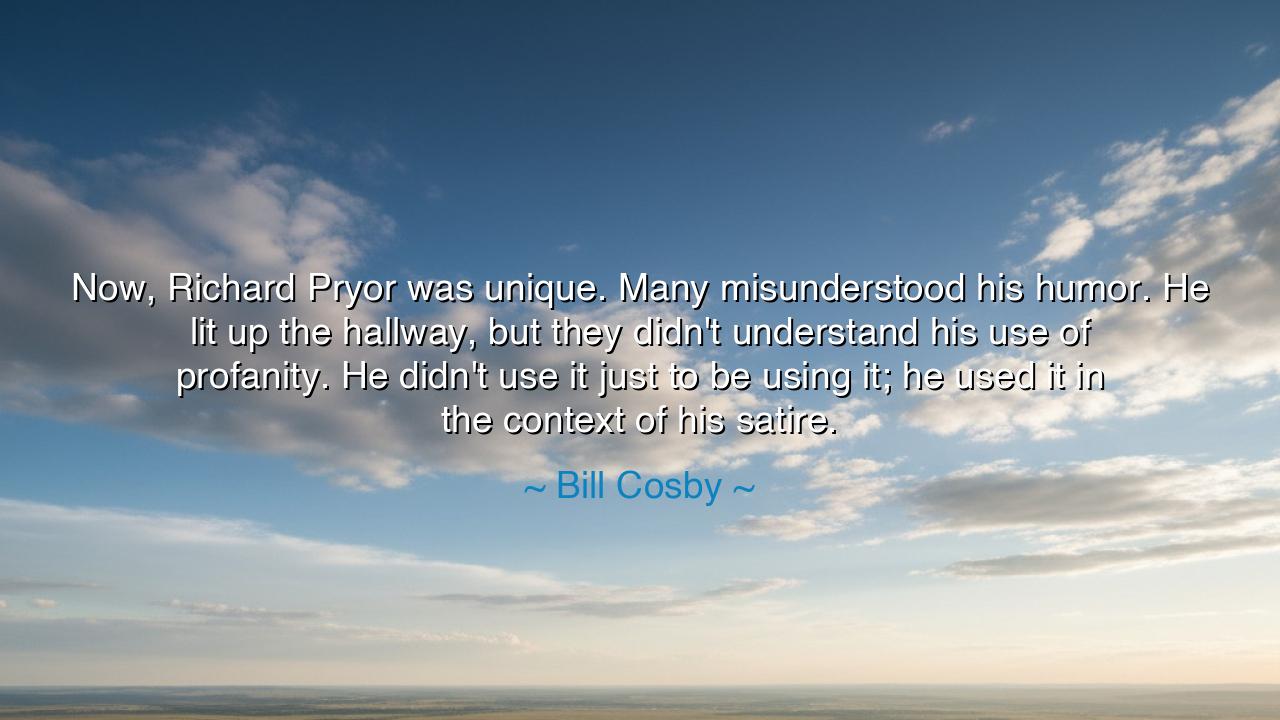
Now, Richard Pryor was unique. Many misunderstood his humor. He
Now, Richard Pryor was unique. Many misunderstood his humor. He lit up the hallway, but they didn't understand his use of profanity. He didn't use it just to be using it; he used it in the context of his satire.






When Bill Cosby said, “Now, Richard Pryor was unique. Many misunderstood his humor. He lit up the hallway, but they didn't understand his use of profanity. He didn't use it just to be using it; he used it in the context of his satire,” he was not only speaking of a fellow comedian—he was speaking of an artist who carried fire within him. In this tribute, Cosby was honoring a man whose genius was often cloaked in controversy, whose words—though rough to the ear—were tender with truth. His reflection carries a lesson older than comedy itself: that true art, when honest, will often shock before it enlightens. Pryor’s voice was raw because the world he came from was raw; his humor was profane because the truth he spoke was born from pain.
The origin of this insight lies in the bond and contrast between these two giants of American comedy. Cosby, polished and family-friendly, crafted humor from gentleness and grace. Pryor, fierce and unflinching, tore laughter from the wounds of life. Yet both men sought the same thing—the mirror of truth that reflects humanity as it is, not as it pretends to be. Cosby’s words acknowledge what many could not see: that Pryor’s profanity was not rebellion without reason. It was the language of his people, the rhythm of the streets, the cry of a soul that refused to be silenced. He wielded those words not as weapons of offense, but as instruments of revelation. Through them, he made the world confront its hypocrisy, its prejudice, its absurdity—and its humanity.
To say that Pryor “lit up the hallway” is to speak of illumination—the kind of brilliance that comes not from refinement, but from fire. In every performance, Pryor burned away the veil of politeness that often hides truth. He spoke of race, poverty, addiction, and fear, and in doing so, he made people see the world anew. Many misunderstood him because they mistook his boldness for blasphemy, his profanity for vulgarity. But as Cosby wisely explained, Pryor’s language had context—it was not chaos, but craftsmanship. His words had purpose, carved from the raw marble of his own experience. Like an ancient prophet clothed in laughter, he spoke the unspeakable so that others might finally understand it.
Consider, for a moment, the story of Diogenes the Cynic, the Greek philosopher who wandered the streets of Athens with a lamp, saying he was searching for an honest man. He mocked kings, exposed hypocrisy, and lived without fear of offense. The Athenians called him mad, vulgar, even profane. Yet centuries later, his words remain—stripped of decorum, but radiant with truth. In the same way, Pryor was a modern Diogenes, holding up a mirror to a nation that needed to laugh at its lies before it could begin to heal. His profanity, like Diogenes’ mockery, was not pollution—it was purification. It burned away falsehood and forced honesty into the light.
There is a sacred paradox in humor that both Pryor and Cosby understood: that laughter can reveal what anger cannot, that sometimes a joke can strike harder than a sermon. Pryor’s satire did not mock for cruelty—it healed through exposure. When he told stories of growing up poor, of police brutality, of the chaos of relationships, people laughed—and in that laughter, they recognized themselves. They saw their pain reframed, their fear named, their humanity redeemed. Pryor’s comedy was confession made cosmic; his profanity was the thunder that carried truth’s lightning. Those who dismissed him for his language missed the holiness hidden within his humor.
Cosby’s words also reveal a deeper truth about understanding. In every age, those who speak boldly are misunderstood. The poet who challenges the order, the philosopher who questions the gods, the artist who refuses to conform—they all pay the same price. So it was with Pryor. Yet, as the ancients taught, misunderstanding is often the shadow that accompanies greatness. The true artist must endure it. For the purpose of expression is not comfort, but awakening. And sometimes, to awaken the world, one must first shake it. Pryor did this through laughter that was equal parts joy and fire.
So, my children of wisdom and word, learn this from Richard Pryor and from Bill Cosby’s tribute: do not mistake bluntness for emptiness, nor passion for profanity. Truth often arrives wearing rough garments, and laughter is one of its most powerful messengers. When you speak, let your words have purpose. When you create, let it spring from the marrow of your experience. Speak not to please, but to reveal; not to shock, but to awaken. For words that carry meaning will always outlive those that merely entertain.
And finally, remember this lesson: the context of truth sanctifies even the harshest sound. Pryor’s gift was not his language, but his insight—the ability to turn pain into laughter, and laughter into understanding. So, when you face misunderstanding for being honest, do not despair. Be like Pryor—let your light fill the hallway. Speak with courage, laugh with depth, and let your truth shine even when the world mistakes it for profanity. For the tongue may offend, but the heart that seeks truth purifies all.






AAdministratorAdministrator
Welcome, honored guests. Please leave a comment, we will respond soon